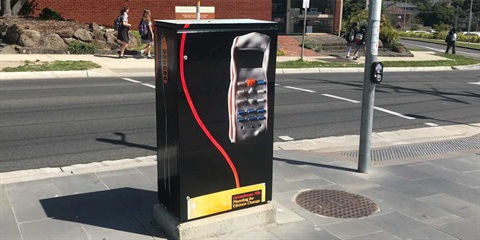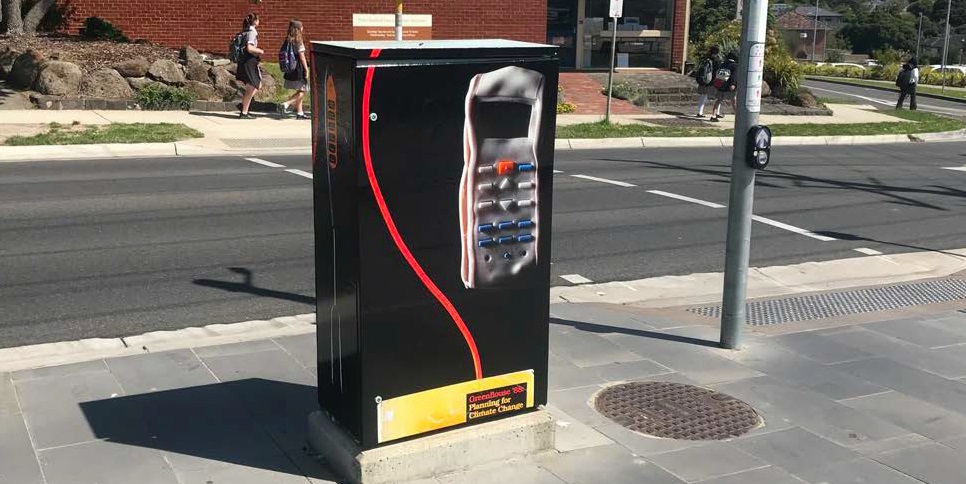Anthropocene Art Trail

Encounter a new series of Ringwood arts precinct commissions in a leisurely walk between ArtSpace at Realm and Maroondah Federation Estate Gallery.
The commissioned works have responded to the theme ‘Anthropocene and are inspired by issues surrounding the environment, sustainability and climate change.
Trail map
Anthropocene Art Trail map(PDF, 3MB)
Unleashing Hell
By Neville Cichon
Station Street, adjacent to Ringwood Station car park (near Kendall Street)

Neville Cichon, Unleashing Hell 2019, digital print on signal box
Climate change is dramatically increasing the risk of catastrophic bushfires. The Unleashing Hell series was inspired from a quote by Australian climatologist Neville Nicholls stating that because of inaction on reducing carbon emissions, climatic changes will disastrously increase the prevalence and impact of bushfires such that ‘we are unleashing hell upon Australia’.
References to electricity and energy consumption throughout this series aim to highlight the role of coal-fired power stations as the single largest contributor of carbon emissions in Australia. The remote control is used to highlight our reliance on air-conditioning, a result of inappropriate house design. The Fire Danger Rating applies ‘catastrophic’ for conditions at 100 or higher on the scale, while some of our most deadly fires have exceeded 180. If melting ice caps and rising sea levels do not drive action on climate change, it may be the increased prevalence of bushfires that ignites our actions.
Read more about Neville Cichon
Icy Cold World
By Mark Bernard
Corner Wantirna Road and Station Street, Ringwood
Mark Bernard, Icy Cold World 2019, digital print on signal box.
The piece Icy Cold World considers the effects of climate change on Arctic animals. This piece reflects the way humans have impacted the environment and how nature has to adapt to mankind’s actions in order to survive. The shape of the signal box is similar to a commercial ice dispenser; it is a form people can instantly recognize.
Mark Bernard was born in Melbourne, 1982 to South Indian parents who migrated to Australia in the late seventies. A self-taught artist, he has only recently resumed painting on canvas after an absence of more than a decade. His artwork mainly consists of acrylics, paint markers and digital art. His work is strongly influenced by street art and Hip Hop music.
See more on Mark's instagram @SKETCHNKUSTOM
The Curiosity Cabinet
By Carla Gottgens
Corner of Bedford Road and Warrandyte Road
Carla Gottgens, The Curiosity Cabinet 2019, digital print on signal box.
A curiosity cabinet holds artefacts and memorabilia from the past. This cabinet is a snapshot of many of the issues we are focussing on in 2019. Were we to look back upon it in fifty years’ time, many of these items will either be extinct, out of production, forgotten or reclaimed.
The collection has a strong environmental focus, including a lump of coal, PET plastic bottle, electric car, and a ‘keep cup’. It includes motifs that reference the political (Donald Trump, Black Lives Matter and Gay Pride); the social (a naked statue of Kim Kardashian created like a Roman Goddess); and modern gadgetry (VR goggles). The artwork is viewed from the front as though it is an actual cabinet, and the objects vary in size, encouraging viewers to stop, linger, peer into the cabinet and discover each item.
Read more about Carla Gottgens
Dhaganhu Ngurambang / Where is your country?
By Vandal Hype
Railway Place (near kiosk)
Vandal Hype, Dhaganhu Ngurambang / Where is your country? 2019, digital print on signal box.
I choose this title in my Indigenous language, Wiradjuri, because I believe it can be interpreted in several different ways and will challenge viewers to think about what this statement means to them. People think they own the country on which they’re on, but the country, land, was here long before us. Country doesn’t stay the same. It changes, it adapts, it moves, it breathes and regrows. This beauty is ever-evolving, continually changing— with or without us. That’s what my piece represents.
Read more about Vandal
Intersection
By Elizabeth West
30 Wantirna Road (at the pedestrian crossing)
Elizabeth West, Intersection 2019, digital print on signal box.
This work invites reflection on our relationship to materials and environments. Images of landscape and plastic are spliced together in a photo-montage, like a digital form of weaving. The material used to wrap everyday items now wraps an image of the landscape, as well as an urban form.
At the point of intersection, things can become distorted and perspectives can shift. Lines incorporated into the design echo the familiar pedestrian crossing. This element is a reminder that we are all pedestrians of the Earth, no matter how we travel. Like crossing the road, we need more than ever to open our eyes. To focus on lines of sight to see through the distortions and complexity. To commit to cultivating sustainable practices. At the intersection we’re presented with an opportunity. We need to acknowledge and take responsibility, because we are wrapped up in this process together with our planet.
Imprint
By Gareth Hart
Ringwood Station (Maroondah Highway)
Gareth Hart, Imprint 2019, digital print on signal box.
This work emerges from the Places We Sit series by artist Gareth Hart. With humour and playfulness, the series reflects upon human habitation and the impact on local environments and culture. Within the context of the ‘Anthropocene’, this work employs beauty and composition to engage an audience in thoughtful reflection on the triangular relationships between the natural world, our bodies, and that ubiquitous icon of industrialisation: plastic.
As a metaphor for our presence within this planetary context, the chair represents the significant impact we have had through settlement, on the pre-existing world. As a counterpoint to Al Gore documentaries, melting ice caps, and the intensity of deforestation, Places We Sit asks us to consider our personal embodied impact on very local surroundings, with a lightness of being. Gareth grew up in Croydon on the unceded lands of the Wurundjeri.
Read more about Gareth Hart
Location
Between Maroondah Federation Estate and ArtSpace at Realm, Ringwood 3134 View map
-37.8145771,145.2310109
Between Maroondah Federation Estate and ArtSpace at Realm ,
Ringwood 3134
Between Maroondah Federation Estate and ArtSpace at Realm ,
Ringwood 3134
Anthropocene Art Trail